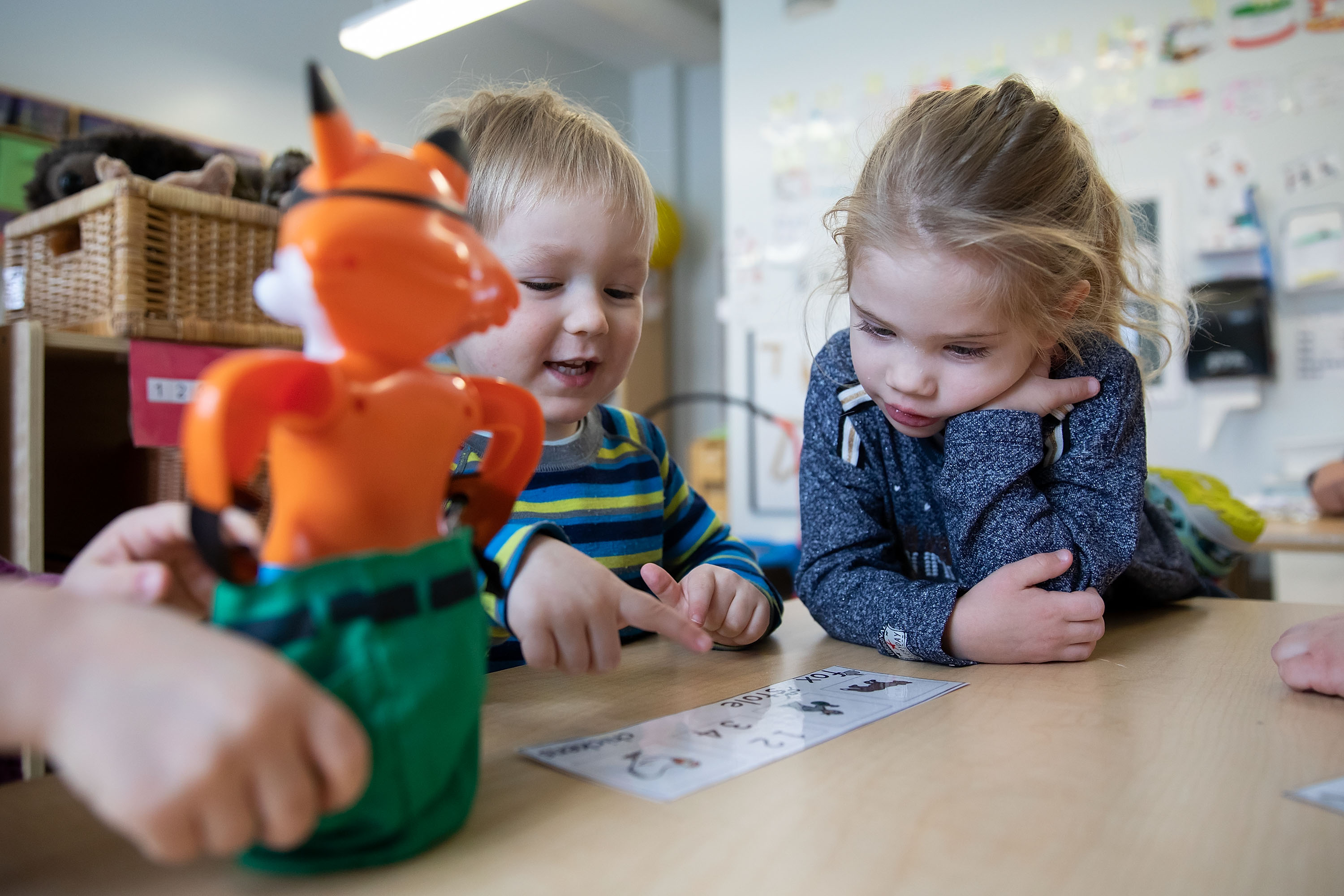Early intervention leads to better outcomes for kids with speech-language delays, U of A researchers say
Amie Filkow - 15 October 2020

One in 14 kids -- two children in every classroom -- are diagnosed with developmental language disorder (DLD), a common but hidden disability that causes difficulties with speaking, understanding and reading.
When Knox Schulz was 18 months old, his parents, Jill and Zach, knew he was different from his brothers. At first they chalked it up to individuality – of course each of their three kids would have their own distinct personalities. But as time went on, Jill couldn’t shake the feeling that Knox, their youngest, was not developing at a normal rate. He was alert but quiet. He only made a few sounds — “ma,” “da,” “ba.”
One night, after their older boys were asleep, Jill asked Zach if he thought there was something worrisome about Knox. “I remember crying when Zach told me he’d been thinking the same thing. Neither of us had wanted to say it.”
Their family doctor had Knox assessed by a speech-language pathologist (SLP). “They told us he was severely speech delayed,” said Jill. She and Zach were relieved to know what they were facing. The SLP referred Knox to the University of Alberta’s Faculty of Rehabilitation Medicine Corbett Hall Speech-Language Clinic and Corbett Hall Early Education Program (CHEEP), a preschool program for three to five year olds who have been diagnosed with speech-language and developmental delays.
Speech-language disorders are more common than many people realize. Between eight and 12 per cent of Canadian preschoolers have some form of language impairment. By the time they get to kindergarten, some of them will be diagnosed with underlying issues like autism spectrum disorder or cerebral palsy. Others will catch up to their peers. But one in 14 kids — about two in every K-12 classroom — will be diagnosed with developmental language disorder (DLD), a difficulty understanding and expressing themselves in their native language that does not resolve on its own.
“Children with DLD struggle to speak fluently and grasp what others are saying, which impacts their social relationships and ability to benefit from classroom instruction,” said Trelani Chapman, assistant professor, Department of Communication Sciences and Disorders, Faculty of Rehabilitation Medicine. They are also at high risk for reading disorders, she said.
“The challenges for these children don’t end at school, they continue into adulthood,” said Chapman. “Research shows a link between early school struggles and later employment and economic disadvantages. Being able to understand and convey your ideas is so key to a person’s health and well-being.”
While it can take some time to identify if a child’s speech delays are caused by DLD or another underlying cause, early intervention means the difference between progress and long-term challenges.
“Each year there is at least one child in CHEEP who will go on to have a DLD diagnosis,” said Jamie Maschmeyer, a U of A speech-language pathologist who created the preschool program within the Department of Communications Sciences and Disorders in 2002 and continues to lead it as program director. “Determining what is causing the communication delay takes some sorting out when kids first come to us, but the preschool years are an optimal window for intervention. As kids move into elementary school, it gets more difficult to access speech and language support, so targeted intervention is significantly reduced.”
Knox thrived at CHEEP, said Jill. The multi-disciplinary team of teachers, speech-language pathologists, occupational therapists and physical therapists engaged him in a variety of play, speech, fine motor and gross motor activities. “The playing is always working on their speech. Knox would come home and say, ‘We went on an airplane today.’ ”
By the middle of Knox’s second year in the program, Jill was confident he would be able to continue on to kindergarten. “We finally made it to a point I wasn’t sure he would get to.”
Maschmeyer said a good portion of kids finish CHEEP no longer presenting with a severe delay.
And how would the same kids fare if they did not receive early intervention? “They would show up for kindergarten unable to communicate effectively with their teachers and peers. They wouldn’t have had an opportunity to build the social and emotional wellness needed to participate meaningfully,” she said.
Today Knox attends the same German bilingual school as his brothers. His mom notes that he has now become more verbal than his older brother. “I can leave him alone with anyone and be confident he will ask for what he needs.”
Knox will continue to need support for some of his developmental delays, but for now, the Schulzes are thankful. “I truly believe Knox wouldn’t be going to regular kindergarten without CHEEP, and he wouldn’t be as far along with his language skills.”
Developmental language disorder is common but not well known. More public awareness of DLD is crucial, said Chapman, since early assessment, diagnosis and speech-language therapy can change the path of a child’s life. “The beauty is that children never know the trajectory they were on, that without these services their life path would have been drastically different. Early intervention changes lives. Everyone should be aware of DLD, so then maybe somebody in a child’s life — their auntie, their grandpa — will say, ‘Maybe he should have a speech assessment.’ ”
October 16th is International Developmental Language Disorder Awareness Day. For more information and to learn about Light Up events happening throughout the world, visit radld.org or use the hashtag #DLDSeeMe on social media.